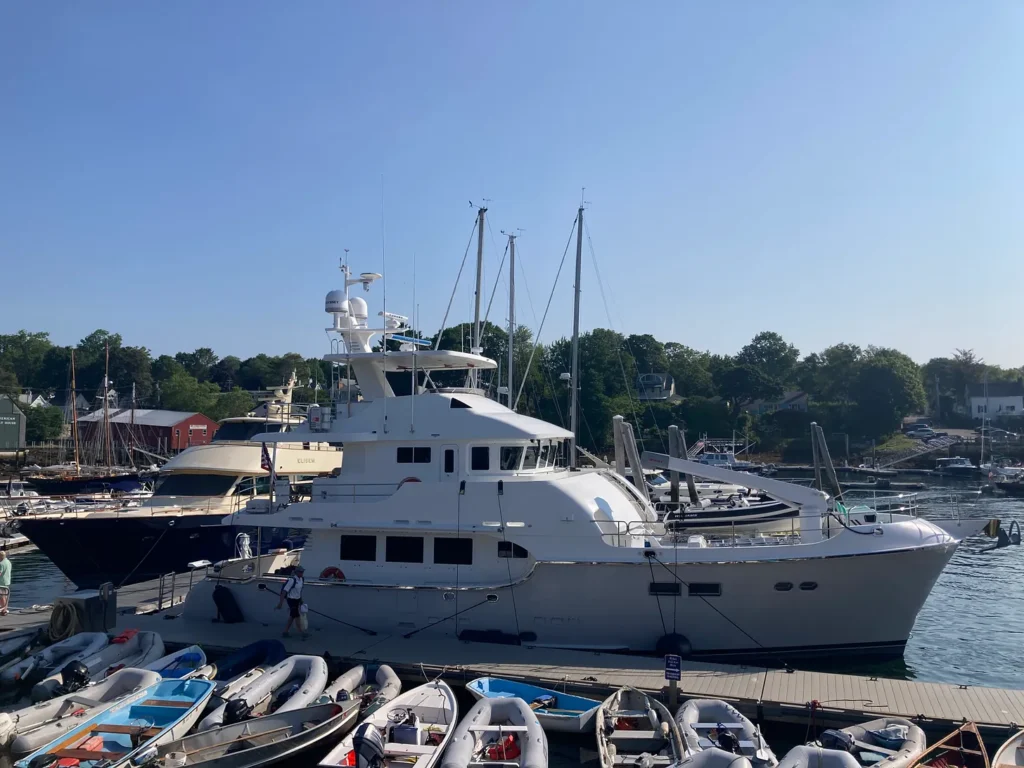This is not the Maine summer of my dreams. It’s hotter, drier, and hazier with the smoke of western wildfires. If you’re also feeling this way, you’re not alone. And you’re not wrong. According to an August 7 report:
Last summer was Maine’s hottest on record.
And data from the Maine Climate Council show the state is getting hotter: we’re 3.5 degrees above the historical average already, with projections that it will be up to 10 degrees higher by the end of the century, depending on how successful the world is at reducing heat-trapping gas emissions from the burning of fossil fuels.
I love the cool, crisp, cooling breeze off the ocean. There’s not so much of that these days. Today, as I write this, my pocket weather device reports today’s temperature is 14 degrees F above average.
And this might be our coolest summer of all to come.
Sobering thoughts.
And yet.
Large fossil fuel boats dominate our town dock. Folks stopping at a local farmstand keep their gasoline engine cars idling while they duck in to buy a few organic, local vegetables. Folks hop into cars for errands less than a half mile away.
And at a recent talk at the yacht club there was great concern for sea level rise, and little response to the notion that perhaps instead of further engineering studies for the town, we’d be better served by discussions of meaningful policies and practices that would lead the town—and all its citizens—to reductions in greenhouse gas emissions.
It’s a rough time for those of us who believe the climate models:
Climate models project the futures they have to. They have no choice: Put more greenhouse gases in the atmosphere and the world gets hotter. The laws of physics are merciless that way…But these models, useful as they are, have nothing to say about the business of living in that broken world, loving it for all its terrible flaws, and repairing it in all the little ways you can.
—Kate Marvel, Human Nature: Nine Ways to Think About the Climate Crisis, p 221
Bound Together in Our Climate-Changed Midcoast
If you’re reading this I suspect you’re also under the spell of the Midcoast—whether it’s our rocky coast adorned by its dripping rockweed skirt, or our granite-scoured hills in their autumn splendor, or the sublime, eerie evening call of the loon at the harbor—herematters to you.
We are bound together by this love of place, love of planet. We also share a grief, a rage, a fear and sadness—all together—at the lost cool summers, tinged perhaps by the broader failings of the wider world, too.
We love this world, this being alive. That love is our sustainable fuel for changing the course of human activity on our warming planet.
We get to be fueled by visions of how to create a better future. What can be done to reduce wildfires so the air clears? What can be done to cool the ocean so that local species can thrive?
We, the ancestors of the future generations, have the responsibility of leaving the world a better place. What legacy can you leave that you’ll be proud of?
What Can Camden and Midcoast Residents Do?
There are many actions, and they all involve committing to make an effort to do our part — to make choices that leave a better world for the future. It might mean not driving your gas-powered car for a day or two a week. It might mean choosing to turn down your winter thermostat; walking to downtown errands; asking our Select Board to focus more on a walkable town, ban large powerboats, and make a plan for reducing the town’s carbon footprint.
This is not about perfection, this is about consistent improvement toward a clean energy future.
If we were talking 20 or 30 years ago, we would say, okay, what we need is leadership. Yes, we need the leadership, but we also need the behavioral change that each of us can undertake. And hence, in so doing, become leaders for ourselves and for our friends and families and neighbors. So there is at this point, honestly, no space, I think, for anyone to say there’s nothing I can do. Question what type of energy are you buying. Question what kind of food are you consuming. What are you teaching your family in terms of food consumption? In terms of energy? Do you know where your savings are? Are they in fossil fuels? Are they in clean technologies? How do you vote? How do you vote at the community level? At the regional level? At the national level? How are you voting? Are you actually in touch with community action that is happening all around you in your neighborhood?
For me, it really is a choice here. We have to choose whether we’re going to just go with the flow with the default, which currently is a very highly carbonized society economy, behavior. If we’re just going to go with the flow or if we’re going to decide that we want to make a difference because we have to make that difference until that difference becomes the mainstream, until it is normalized, it is not normalized yet. We have many isolated cases of change, of courage, of determination. But low-carbon or no-carbon is still not mainstreamed. And make no mistake. We need more internal energy to stand up against the mainstream, because status quo is always much easier and more comfortable. You can’t just stay in your comfort zone to make a difference. You have to conjure up more effort and more determination, so that is a daily choice. Where do I want to put my energy?
—from Outrage and Optimism #308, Mistakes, Mistruths and Misinformation: Climate’s Biggest Myths Debunked, withChristiana Figueres and Paul Dickinson
Local Upcoming Events for Our Climate-Changed World
8/14/25, Thursday, 5:30 pm—later! Bayview Point Event Center, Belfast, 2025 Bay Bash, Join Upstream Watch to celebrate the launch of Penobscot Bay Waterkeeper and help permanently protect the Little River. Tickets include refreshments, and dancing to the Boneheads. FMI see here.
8/14/25, Thursday, 6:30 pm, Rockland Public Library. Rockland’s Forests As Lens on Maine’s Changing Climate. Talk with UMaine Professor Emeritus Dr. Ivan Fernandez. Free, open to all. Email elewis@rocklandmaine.cover for information/Zoom link.
8/16/25, Saturday, 10:00 am to 4:00 pm, Rockland. Rockland Food and Pollinator Garden Tour. Self-guided tour of 10+ public and backyard gardens. Garden tour hosts on site to answer questions. Registration required at rocklandmaine.gov/gardentour.
8/23/25, Saturday, 10:00 am to 3:00 pm, 2179 Heald Hwy, Union. Radical Reuse Festival and Artisan Fair. Reuse Marketplace: Shop for unique, handcrafted items made from reclaimed materials, including furniture, jewelry, art, and more! Support local makers and take home one-of-a-kind treasures. Chestnut St. House Exhibition & Sale: Witness the transformation of materials salvaged from an historic house in Camden into stunning creations. Many of these showcased items will be available for purchase. Second Story Internship Creations: Explore and purchase works crafted by participants in our paid summer internship program. These young builders and craftspeople (ages 16-24) have spent the summer learning deconstruction, material processing, and design/build skills, culminating in this event. Will also feature food and live music. For more information see here.
8/27/25, Wednesday, 6:00 pm, Rockport Public Library, Stewarding Tomorrow: How Rural Youth Are Strengthening Maine’s Communities and Rural Landscapes, a talk with Larissa Holland, JustME for JustUS Development Director. From hosting town forums to engaging their neighbors in conversations about environment and community, Holland will spotlight inspiring young leaders who are rooted in place and committed to preserving the values and landscapes that define rural life. Co-presented by the Maine Appalachian Mountain Club. For more information, see here.
9/5 and 9/7, Friday and Sunday, Camden and Rockport, CamdenCAN’s Food Garden Tour. For more information, see here.
A Resource Worth Checking Out
Last Friday we joined Portland’s Coffee & Climate on Living Shorelines in Maine with Pete Slovinsky, Maine state geologist. The talk highlighted several projects around the state that are stabilizing shorelines and waterfronts with natural solutions, including dunes, bluffs, and marshes. You can watch the presentation here.
Concluding Thoughts
I wish I weren’t living in a climate-changed world, but it’s obvious that I am. Summer is warmer in Camden. Falls and winters are warmer, too.
There is not a place on this planet that’s not been changed by the rapid accumulation of carbon dioxide in our atmosphere. We have fouled the seven miles of troposphere that sits above us—that is a shorter distance than the drive to Rockland. We didn’t know at first. But now the science is clear, known, and proving itself correct.
We know the science despite the current administration’s efforts to disappear that science. We can feel it.
Around the world they know better—as demonstrated by WHO’s June 2025 declaration that the climate emergency is a health crisis “that is already killing us.”
What will it be, incremental steps to change, or status quo? The decision is up to each of us.

